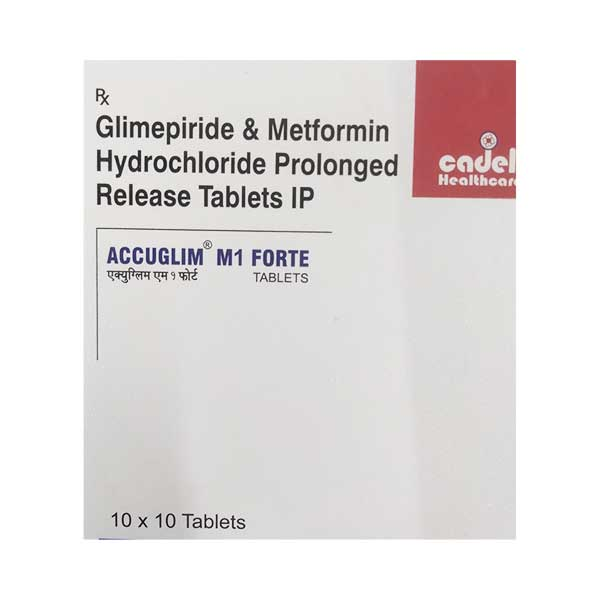ACCUGLIM M1 FORTE TABLET 10S – Discover the Secrets
Key Features and Benefits:
- Effective Glucose Control: ACCUGLIM M1 FORTE TABLET 10S combines the reliable blood sugar-lowering effects of Glimepiride and Metformin. This dynamic duo works together to regulate insulin levels and reduce glucose production in the liver, allowing you to maintain stable blood sugar levels.
- Enhanced Insulin Sensitivity: By improving your body’s sensitivity to insulin, ACCUGLIM M1 FORTE TABLET 10S helps your cells effectively utilize glucose. This not only promotes healthy glucose metabolism but also reduces the risk of insulin resistance, a common complication of diabetes.
- Weight Management: Metformin in ACCUGLIM M1 FORTE TABLET 10S can assist in weight management by curbing appetite and fostering weight loss. By tackling the link between obesity and diabetes, this medication offers holistic support for your overall health and well-being.
- Heart Health: ACCUGLIM M1 FORTE TABLET 10S has the added advantage of potentially improving cardiovascular health. Metformin has shown to have protective effects on the heart, reducing the risk of heart attack and stroke in individuals with diabetes.
₹59.00
CompareProduct Introduction:
The combination of Glimepiride (1mg) and Metformin (1000mg) is a medication used to manage type 2 diabetes. Glimepiride belongs to the sulfonylurea class and works by stimulating the pancreas to produce more insulin, while Metformin is a biguanide that improves the body’s response to insulin and reduces the amount of glucose produced by the liver. This combination is often prescribed to enhance blood sugar control in individuals with type 2 diabetes.
ACCUGLIM M1 FORTE TABLET should be taken with food. Take it regularly at the same time each day to get the most benefit. Your doctor will decide what dose is best for you and this may change from time to time according to how it is working according to your blood sugar levels.
Keep taking this medicine, even if you feel well or your blood sugar levels are controlled. If you stop it without consulting your doctor, your blood sugar levels could rise and put you at risk of kidney damage, blindness, nerve problems, and loss of limbs. Remember that it is only part of a treatment program that should also include a healthy diet, regular exercise, and weight reduction as advised by your doctor. Your lifestyle plays a big part in controlling diabetes.
The most common side effect of ACCUGLIM M1 FORTE TABLET is low blood glucose levels (hypoglycemia). Make sure you recognize the signs of having low blood glucose levels, such as sweating, dizziness, headache, and shaking, and know how to deal with it. To prevent this, it’s important to have regular meals and always carry a fast-acting source of glucose such as sugary food or fruit juice with you. Drinking alcohol can also increase your risk of low blood sugar levels and should be avoided. Other side effects that may be seen on taking this medicine include taste changes, nausea, diarrhea, stomach pain, headache, and upper respiratory tract infection. Some people may find that they put on weight with this medicine.
Benefits:
- Blood Sugar Control: The combination helps lower and regulate blood sugar levels by addressing different aspects of glucose metabolism.
- Improved Insulin Sensitivity: Metformin enhances the body’s sensitivity to insulin, making it more effective in lowering blood sugar levels.
- Reduced Glucose Production: Metformin reduces the production of glucose by the liver, helping to prevent excessive sugar release into the bloodstream.
- Enhanced Insulin Release: Glimepiride stimulates the pancreas to release insulin, further aiding in glucose absorption by cells.
Side Effects:
Common side effects of Glimepiride + Metformin may include:
- Hypoglycemia (Low Blood Sugar): This risk is higher with Glimepiride. Symptoms may include sweating, shakiness, dizziness, and confusion.
- Gastrointestinal Issues: Nausea, vomiting, diarrhea, and abdominal discomfort are possible side effects, particularly with Metformin.
- Weight Gain: Some individuals may experience weight gain.
- Lactic Acidosis: While rare, Metformin can potentially cause a serious condition called lactic acidosis. Symptoms include muscle pain, weakness, trouble breathing, and irregular heartbeat. Seek immediate medical attention if these symptoms occur.
Drug Interactions:
It’s crucial to inform your healthcare provider about all medications you are taking to avoid potential interactions. Some notable interactions include:
- Certain Antibiotics: Some antibiotics can interact with Metformin.
- NSAIDs (Nonsteroidal Anti-Inflammatory Drugs): They may increase the risk of kidney problems when taken with Metformin.
- Beta-Blockers: May mask symptoms of hypoglycemia caused by Glimepiride.
- Thiazide Diuretics: Can increase blood sugar levels.
Always follow your healthcare provider’s instructions, monitor blood sugar levels regularly, and report any unusual symptoms or side effects promptly. Individual responses to medications can vary, so it’s important to communicate openly with your healthcare team.
SAFETY ADVICE

Alcohol

Pregnancy

Breast feeding

Driving

Kidney
Use of ACCUGLIM M1 FORTE TABLET is, however, not recommended in patients with severe kidney disease. Regular monitoring of kidney function test is advisable while you are taking this medicine.

Liver
ACCUGLIM M1 FORTE TABLET is generally started with low dose in patients with mild to moderate liver disease and its use is not recommended in patients with severe liver disease.
| Weight | 0.5 kg |
|---|---|
| Dimensions | 10 × 10 × 10 cm |
Related products
-
Medicines
A TO Z IMMUNE TABLETS 16S – Comprehensive Immunity Support
0 out of 5(0)MARKETER
Alkem Laboratories Ltd
Key Features:
- Giloy Extract: Known for its immune-boosting properties, Giloy Extract strengthens your body’s natural resistance and promotes overall well-being.
- Curcumin Longa Extract: With its potent antioxidant and anti-inflammatory properties, Curcumin Longa Extract supports a healthy immune response, while maintaining optimal cellular function.
- Echinacea Purpurea (Purple Coneflower) Extract: Known for centuries as an herbal remedy, Echinacea Purpurea Extract stimulates the immune system and aids in fighting infections.
- Piperine Extract: Enhances nutrient absorption, amplifying the effectiveness of the other key ingredients and providing an extra boost to your immune system.
- Essential Vitamins and Minerals: A TO Z IMMUNE TABLETS 16S is fortified with Vitamin A, Vitamin B6, Vitamin C, Folic Acid, Vitamin B12, Zinc, Chromium, and other vital nutrients, ensuring your body receives the support it needs to stay healthy.
- Quality Ingredients: Our tablets are made with premium ingredients, sourced from trusted suppliers to guarantee their purity and effectiveness.
- Easy to Use: Simply take the recommended dosage with water as a part of your daily routine.
SKU: n/a



